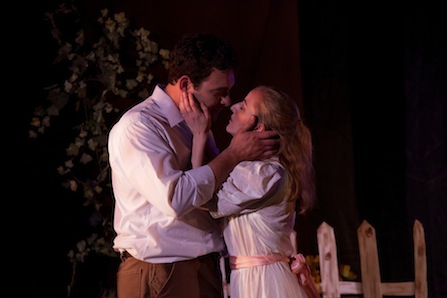Chelsea Opera finds the humanity in Copland’s slight “Tender Land”

Joanie Brittingham and Chad Kranak in Copland’s “The Tender Land” at Chelsea Opera. Photo: Robert J. Saperstein
With all the drama going on at Lincoln Center, one might almost forget that there is opera going on anywhere else in New York. While we hope for a speedy resolution to those disputes, it’s worth taking a look at the admirable work being done by the city’s independent companies.
Chelsea Opera, a troupe with a marked “little-opera-company-that-could” spirit, closed its season on Saturday with a staged production of Aaron Copland’s The Tender Land at St. Peter’s Church on 20th Street.
The opera has not aged well, reading as somewhat gooey Americana, a bright-eyed pick-yourself-up kind of story. In a small rural Kansas town, everyone is preparing to celebrate the high school graduation of Laurie Moss. A pair of migrant workers, Top and Martin, show up and are taken on as farmhands by Laurie’s overprotective grandfather.
As the graduation party winds down that night, Martin and Laurie find themselves alone, declare their love for each other, and share a long kiss, only to be caught in the act by Grandpa Moss, who banishes the two workers. At daybreak, Laurie realizes that if she is ever to have a life of her own, she has to leave the town and with it everything she has known.
The storyline is relatively humorless in its realization, and, while there is joyful celebration in the party scene, and angst elsewhere, the emotional stakes never seem particularly high. Ford ramatic impact, The Tender Land relies most on Copland’s music, which is richly woven on a large scale, but tends to lean towards lethargy. Conductor Samuel McCoy and his orchestra were remarkable, generating an impressive, full sound from just a thirteen-piece band. McCoy’s pacing fought against the opera’s dragging tendency, and for the most part he kept singers and players precisely together.
As Laurie, soprano Joanie Brittingham was the standout in a generally solid cast. She has an effortlessly sweet warble, with a free, easy tone that gave way only once at the top of her register. Her acting was what really set her apart: She fully embodied her character, making the most out of what is a fairly contained emotional arc, and even showing a glimpse of maturation at the end. She has a captivating stage presence, possessed of the sort of innocent kindness that makes her instantly sympathetic and familiar, so that the audience feels completely comfortable with her from the moment she walks on.
Martin, played by tenor Chad Kranak, had excellent chemistry with Brittingham, but was less vocally secure. Where there was ease, there was not much tone, and where there was considerable tone—mostly when he was really belting at the top of his range—there was effort and some insecurity of pitch. Peter Kendall Clark, as his partner Top, had a gruff demeanor and a leathery baritone to match.
After a touchy beginning, Steven Fredericks proved to be one of the strongest voices of the cast as Grandpa Moss. A big, oaky bass, he got a little too creaky towards his very lowest end, but for the most part brought a powerful sound and warm presence. Leonarda Priore, one of the company’s founders, made a sympathetic and caring Ma Moss, but the slight vocal part felt overburdened by her voice. David Kellett was delightful and even-toned as the kindly postman Mr. Splinters.
As far as staging, director Lynne Hayden-Findlay presented essentially what one would expect from a small company. A rudimentary set presented the Moss family’s front yard, while hung curtains with flap entrances suggested a simply-constructed house and shed. Without the space, resources, or expertise necessary for a real dance number, the party scene included the ensemble engaging in a very basic folk dance that broke the action somewhat.
But where it counted most—in the acting—the stage direction was superb, as there was breathing humanity from every member of the cast. Kimmy Norrell deserves particular mention, a vibrant presence as Laurie’s younger sister Beth.
Posted Jun 15, 2014 at 7:45 pm by John David Earnest
Eric Simpson’s review of Chelsea Opera’s production of “The Tender Land’ is perceptive and deservedly generous to this feisty small opera company, especially about the solid cast, the inventive staging, the fine orchestra and conductor, and the elegantly crafted Copland score (as well as the somewhat slack storyline).
Simpson’s praise of the orchestra under the direction of Samuel McCoy is spot-on (Murry Sidlin’s 1987 chamber orchestration is a marvel), and his lauds for individual singers Joanie Brittingham, Peter Kendall-Clark, and Steven Fredericks are well-deserved by those excellent performers.
But Simpson misses the mark about the role of Ma Moss, superbly sung and acted by Leonarda Priore. This role is no “slight vocal part.” Ma Moss is as much at the center of this work as is her daughter, Laurie.
The story of “The Tender Land” is really about the two women,
mother and daughter, one whose dreams are lost, and one whose dreams are yet to be realized.
Copland and Everett (the librettist) clearly gave Ma Moss and Laurie equal importance, both dramatically and musically. It is that relationship between two generations of women, during a terrible time in America history, that makes the drama of this opera quietly compelling.
John David Earnest